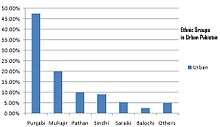Urbanisation in Pakistan
Urbanisation in Pakistan has increased since the time of independence and has several different causes. The majority of southern Pakistan's population lives along the Indus River. Karachi is its most populous city.[1] In the northern half of the country, most of the population lives in an arc formed by the cities of Lahore, Faisalabad, Rawalpindi, Islamabad, Gujranwala, Sialkot, Gujrat, Jhelum, Sargodha, Sheikhupura, Nowshera, Mardan and Peshawar. During 1990–2008, city dwellers made up 36% of Pakistan's population, making it the most urbanised nation in South Asia. Furthermore, 50% of Pakistanis live in towns of 5,000 people or more.[2]
Causes of urbanisation

Immigration, both from within and outside the country, is regarded as one of the main factors that has contributed to urbanisation in Pakistan. One analysis of the 1998 Pakistan Census highlighted the significance of the independence of Pakistan in 1947 in the 1940s in the context of understanding urban change in Pakistan.[3] During the independence period, Muslim Muhajirs from India migrated in large numbers and shifted their domicile to Pakistan, especially to the port city of Karachi, which is today the largest metropolis in Pakistan.[3]
Migration from other countries, mainly those in the neighbourhood, has further catalysed the process of urbanisation in Pakistani cities. Of particular interest is migration that occurred in the aftermath of the independence of Bangladesh in 1971,[3] in the form of stranded Biharis who were relocated to Pakistan. Smaller numbers of Bengalis and Burmese immigrants followed suit much later. The Soviet war in Afghanistan in the 1980s forced millions of Afghan refugees into Pakistan, particularly in the northwestern regions. Inevitably, the rapid urbanisation caused by these large population movements has also brought new political and socio-economic complexities.[3]
In addition to immigration, economic events such as the green revolution and political developments, among a host of other factors, are also important causes of urbanisation.[3]
References
- ↑ "The Urban Frontier—Karachi". National Public Radio. 2 June 2008. Retrieved 2 July 2008.
- ↑ Jason Burke (17 August 2008). "Pakistan looks to life without the general". The Guardian. London. Retrieved 20 May 2010.
- 1 2 3 4 5 Clark, David (2006). The Elgar Companion to Development Studies. Edward Elgar Publishing. p. 668. ISBN 978-1843764755.